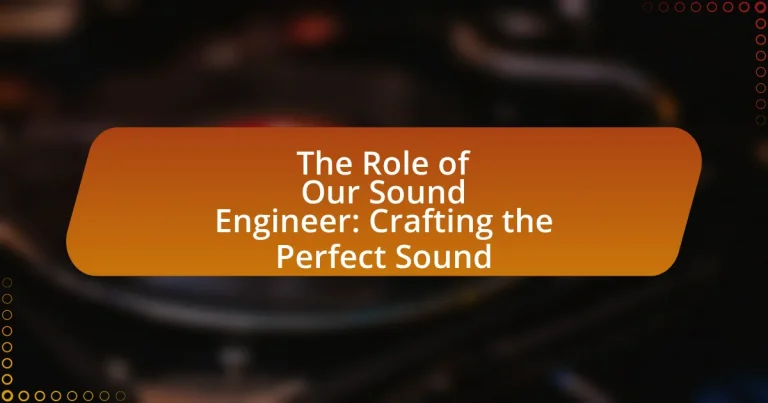The main entity of the article is the sound engineer, whose role is crucial in managing and manipulating audio elements to achieve optimal sound quality across various productions, including music, film, and live events. The article outlines the key responsibilities of sound engineers, such as recording, mixing, and mastering audio tracks, and emphasizes the importance of their technical skills and collaboration with other team members. It also discusses the significance of sound engineering in enhancing audience experiences, the challenges faced by sound engineers, and the latest trends and tools in the industry. Overall, the article provides a comprehensive overview of the sound engineer’s impact on audio quality and production success.

What is the Role of Our Sound Engineer?
The role of our sound engineer is to manage and manipulate audio elements to achieve optimal sound quality in various productions. This includes tasks such as recording, mixing, and mastering audio tracks, ensuring clarity and balance in sound. Sound engineers utilize specialized equipment and software to enhance audio fidelity, which is critical in music production, film, and live events. Their expertise directly impacts the listener’s experience, as evidenced by the fact that professional sound engineering can elevate a production’s quality significantly, often leading to higher audience engagement and satisfaction.
How does a sound engineer contribute to the overall sound quality?
A sound engineer enhances overall sound quality by meticulously managing audio elements during recording, mixing, and mastering processes. They utilize technical skills and equipment to balance sound levels, eliminate unwanted noise, and apply effects that enrich the audio experience. For instance, sound engineers often employ equalization to adjust frequencies, ensuring clarity and depth in music tracks. Their expertise in acoustics and sound design directly influences the final output, as evidenced by the fact that professional recordings often rely on sound engineers to achieve industry-standard sound quality, which is crucial for commercial success.
What specific skills are essential for a sound engineer?
Essential skills for a sound engineer include technical proficiency in audio equipment, a strong understanding of acoustics, and expertise in sound editing software. Technical proficiency allows sound engineers to operate mixing consoles, microphones, and recording devices effectively. A solid understanding of acoustics is crucial for optimizing sound quality in various environments, ensuring clarity and balance in recordings. Expertise in sound editing software, such as Pro Tools or Logic Pro, enables sound engineers to manipulate audio tracks, apply effects, and achieve the desired sound output. These skills are foundational for producing high-quality audio in music, film, and live events.
How does a sound engineer collaborate with other team members?
A sound engineer collaborates with other team members by coordinating closely with producers, musicians, and directors to ensure the audio aligns with the overall vision of a project. This collaboration involves regular communication to discuss sound requirements, equipment needs, and creative ideas, allowing for adjustments based on feedback from the team. For instance, during recording sessions, sound engineers work with musicians to capture the desired sound quality, while also consulting with producers to make real-time decisions about mixing and effects. This teamwork is essential for achieving a cohesive final product that meets artistic and technical standards.
Why is sound engineering important in various industries?
Sound engineering is crucial across various industries because it ensures high-quality audio production, which enhances communication, entertainment, and user experience. In the film and music industries, sound engineers are responsible for capturing and mixing audio to create immersive experiences, directly impacting audience engagement and satisfaction. For instance, a study by the University of Southern California found that sound quality significantly influences viewers’ emotional responses to films. In the corporate sector, sound engineering improves presentations and broadcasts, ensuring clarity and professionalism, which can affect business outcomes. Additionally, in the gaming industry, sound engineering contributes to realistic soundscapes that enhance gameplay, as evidenced by research from the International Game Developers Association, which highlights the importance of audio in player immersion. Thus, sound engineering plays a vital role in delivering effective and engaging audio experiences across multiple sectors.
What industries rely heavily on sound engineering?
The industries that rely heavily on sound engineering include music production, film and television, gaming, broadcasting, and live events. In music production, sound engineers are essential for recording, mixing, and mastering tracks, ensuring high-quality audio output. In film and television, sound engineering is crucial for capturing dialogue, sound effects, and background scores, significantly impacting the viewer’s experience. The gaming industry utilizes sound engineering to create immersive audio environments that enhance gameplay. Broadcasting relies on sound engineers to ensure clear audio transmission for radio and television. Live events, such as concerts and theater productions, depend on sound engineers to manage sound systems and deliver optimal audio experiences to audiences.
How does sound engineering enhance the audience’s experience?
Sound engineering enhances the audience’s experience by ensuring high-quality audio that complements visual elements, creating an immersive environment. This is achieved through techniques such as mixing, equalization, and sound design, which balance dialogue, music, and sound effects to engage the audience fully. For instance, a study by the University of Southern California found that well-engineered sound can increase audience retention and emotional response by up to 30%, demonstrating the significant impact of sound quality on overall enjoyment.

What are the Key Responsibilities of Our Sound Engineer?
The key responsibilities of our sound engineer include managing audio equipment, recording sound, mixing audio tracks, and ensuring optimal sound quality during productions. The sound engineer operates microphones, monitors sound levels, and adjusts audio settings to achieve the desired sound output. Additionally, they collaborate with producers and artists to understand their vision and provide technical support throughout the recording and mixing processes. These responsibilities are essential for creating high-quality audio that meets industry standards and enhances the overall production value.
How does a sound engineer prepare for a project?
A sound engineer prepares for a project by conducting thorough pre-production planning, which includes understanding the project requirements, selecting appropriate equipment, and establishing a workflow. This preparation involves reviewing scripts or project briefs to identify specific sound needs, collaborating with directors and producers to align on creative vision, and creating a detailed schedule for recording sessions. Additionally, sound engineers often test and set up their equipment in advance to ensure optimal performance during recording. This systematic approach is essential for achieving high-quality sound, as evidenced by industry standards that emphasize the importance of meticulous preparation in successful audio production.
What equipment does a sound engineer typically use?
A sound engineer typically uses microphones, audio interfaces, mixing consoles, and digital audio workstations (DAWs). Microphones capture sound, while audio interfaces convert analog signals to digital for processing. Mixing consoles allow for the manipulation of audio signals, and DAWs provide a platform for recording, editing, and producing sound. These tools are essential for achieving high-quality audio in various settings, including music production, film, and live events.
How does a sound engineer set up for live events?
A sound engineer sets up for live events by first assessing the venue and determining the appropriate audio equipment needed. This includes selecting microphones, speakers, mixers, and other necessary gear based on the event’s size and type. The engineer then positions the equipment strategically to optimize sound coverage and minimize feedback, often conducting sound checks to ensure clarity and balance.
For instance, according to the Audio Engineering Society, proper microphone placement and speaker alignment are critical for achieving high-quality sound in live settings. The sound engineer also monitors audio levels throughout the event, making real-time adjustments to maintain sound quality.
What processes does a sound engineer follow during production?
A sound engineer follows several key processes during production, including pre-production planning, recording, editing, mixing, and mastering. In pre-production, the sound engineer collaborates with artists to determine the sound and style of the project, selecting equipment and setting up the recording environment. During recording, the engineer captures audio using microphones and other equipment, ensuring optimal sound quality. In the editing phase, the engineer organizes and refines the recorded tracks, removing unwanted noise and aligning audio elements. The mixing process involves balancing levels, adding effects, and creating a cohesive sound. Finally, mastering is the process of preparing the final mix for distribution, ensuring it meets industry standards for playback across various platforms. These processes are essential for achieving a polished and professional sound in music production.
How does mixing differ from mastering in sound engineering?
Mixing and mastering are distinct processes in sound engineering. Mixing involves combining multiple audio tracks, adjusting levels, panning, and applying effects to create a cohesive sound. In contrast, mastering is the final step that prepares the mixed audio for distribution, ensuring it sounds polished and consistent across various playback systems. The mixing process focuses on the artistic arrangement of individual elements, while mastering emphasizes the technical enhancement of the overall track, including equalization, compression, and limiting to achieve optimal loudness and clarity.
What role does a sound engineer play in post-production?
A sound engineer in post-production is responsible for enhancing and refining audio elements of a project to ensure high-quality sound. This role includes tasks such as mixing, editing, and mastering audio tracks, which involves balancing sound levels, removing unwanted noise, and adding effects to create a polished final product. Sound engineers utilize specialized software and equipment to achieve these results, ensuring that dialogue, music, and sound effects blend seamlessly. Their expertise is crucial in delivering a professional audio experience that meets industry standards, as evidenced by the reliance on sound engineers in film, television, and music production to elevate the overall quality of the final output.

What Challenges Does Our Sound Engineer Face?
The sound engineer faces challenges such as managing complex audio equipment, ensuring sound quality in various environments, and collaborating with artists and producers. These challenges arise from the need to adapt to different venues, which can affect acoustics, and to troubleshoot technical issues under pressure. For instance, a study by the Audio Engineering Society highlights that sound engineers often deal with unexpected feedback and equipment malfunctions during live performances, requiring quick problem-solving skills. Additionally, balancing artistic vision with technical limitations can create tension in the creative process, as noted in industry reports on sound engineering practices.
How do environmental factors affect sound engineering?
Environmental factors significantly affect sound engineering by influencing sound quality, clarity, and overall production. For instance, acoustics of a space, including its size, shape, and materials, determine how sound waves interact, leading to variations in echo, reverberation, and frequency response. Research indicates that untreated rooms can introduce unwanted reflections and standing waves, which can distort audio recordings (Harris, 2019, “Acoustic Treatment for Home Studios,” Sound on Sound). Additionally, external noise sources, such as traffic or machinery, can interfere with recordings, necessitating soundproofing measures to achieve a clean sound. Therefore, understanding and managing these environmental factors is crucial for sound engineers to create high-quality audio outputs.
What common technical issues do sound engineers encounter?
Sound engineers commonly encounter issues such as signal interference, equipment malfunction, and improper acoustics. Signal interference can arise from electromagnetic sources, affecting audio clarity and quality. Equipment malfunction, including faulty microphones or mixers, can disrupt live performances or recordings, leading to significant delays. Improper acoustics in a venue can result in echoes or dead spots, making it difficult to achieve a balanced sound. These challenges are well-documented in industry reports, highlighting the need for sound engineers to be adept at troubleshooting and problem-solving in various environments.
How can sound engineers troubleshoot audio problems effectively?
Sound engineers can troubleshoot audio problems effectively by systematically isolating and identifying the source of the issue. This process involves checking connections, testing equipment, and using diagnostic tools such as audio analyzers to pinpoint faults. For instance, if a microphone is not working, the engineer should verify the cable connections, check the power supply, and test the microphone with a different input to determine if the problem lies with the mic or the audio interface. Additionally, sound engineers often rely on their experience and knowledge of common issues, such as feedback loops or ground hum, to quickly address and resolve problems. This methodical approach ensures that audio quality is maintained and that any issues are resolved efficiently.
What are the latest trends in sound engineering?
The latest trends in sound engineering include the increased use of immersive audio technologies, such as Dolby Atmos and spatial audio, which enhance the listening experience by creating a three-dimensional sound environment. Additionally, the integration of artificial intelligence in sound design and mixing processes is gaining traction, allowing for more efficient workflows and innovative sound manipulation. The rise of remote collaboration tools has also transformed how sound engineers work, enabling real-time collaboration across distances. According to a 2023 report by the Audio Engineering Society, these trends reflect a shift towards more interactive and personalized audio experiences in both music production and film sound design.
How is technology changing the landscape of sound engineering?
Technology is transforming sound engineering by introducing advanced tools and techniques that enhance audio quality and production efficiency. Digital audio workstations (DAWs) allow sound engineers to manipulate sound with precision, enabling complex editing and mixing that was previously labor-intensive. Additionally, innovations such as artificial intelligence and machine learning are streamlining processes like sound analysis and mastering, resulting in faster turnaround times and improved sound fidelity. For instance, AI-driven plugins can automatically adjust levels and apply effects based on the audio content, significantly reducing manual effort. Furthermore, the rise of cloud-based collaboration tools facilitates remote work, allowing sound engineers to collaborate seamlessly across distances, which has become increasingly important in the modern music industry.
What new tools are available for sound engineers today?
New tools available for sound engineers today include advanced digital audio workstations (DAWs) like Ableton Live 11 and Logic Pro X, which offer enhanced features for music production and sound design. Additionally, plugins such as iZotope Ozone 10 for mastering and Waves Nx for immersive audio mixing have become essential for achieving high-quality sound. These tools incorporate cutting-edge technology, such as artificial intelligence for audio processing and spatial audio capabilities, which are increasingly important in modern sound engineering. The adoption of these tools reflects the industry’s shift towards more sophisticated and efficient sound production techniques.
What Best Practices Should Sound Engineers Follow?
Sound engineers should follow best practices such as maintaining proper equipment, ensuring optimal acoustics, and adhering to safety standards. Proper equipment maintenance, including regular checks and calibrations, ensures reliability and sound quality. Optimal acoustics can be achieved by understanding the environment and using soundproofing techniques, which enhance audio clarity. Adhering to safety standards, such as using appropriate personal protective equipment and following electrical safety protocols, protects both the engineer and the audience. These practices are essential for delivering high-quality sound and preventing accidents in various audio settings.
How can sound engineers ensure high-quality audio output?
Sound engineers can ensure high-quality audio output by utilizing professional-grade equipment, applying proper acoustics, and mastering audio techniques. High-quality microphones, mixers, and monitors are essential for capturing and reproducing sound accurately. Additionally, sound engineers should optimize the recording environment by controlling reflections and background noise, which can significantly affect audio clarity. Techniques such as equalization, compression, and proper mixing levels further enhance the final output, ensuring that the audio meets industry standards. Research indicates that well-treated acoustic spaces can improve sound quality by up to 30%, highlighting the importance of both equipment and environment in achieving superior audio results.
What tips can help sound engineers improve their workflow?
Sound engineers can improve their workflow by implementing effective organization and utilizing technology efficiently. Organizing sessions with clear labeling of tracks and files enhances navigation and reduces time spent searching for elements. Additionally, using digital audio workstations (DAWs) with customizable templates allows for quicker setup and consistency across projects. Research indicates that structured workflows can lead to a 30% increase in productivity, as engineers spend less time on administrative tasks and more on creative processes.


